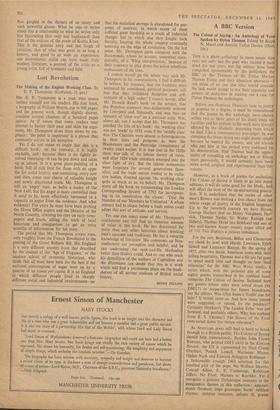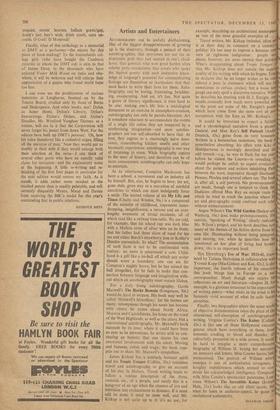A BBC Version
The Colour of Saying : An Anthology of Verse Spoken by Dylan Thomas. Edited by Ralph N. Maud and Aneirin Talfan Davies. (Dent, 18s.) Tins is a ghost anthology in more senses than one; not only has the poet who recited it been dead for ten years but the editors have been compelled (presumably by the publishers, the BBC or the Trustees of the Dylan Marlais Thomas Estate and their attendant attorneys—I can think of no one else who would consider the task worth doing) to use their ingenuity and powers of deduction in making out a case for Dylan Thomas the anthologist.
Before one dismisses Thomas's taste in poetry as popular to a degree, it must be remembered that the poems in this anthology were chosen within two or three years of his death when his faculties and his attitude to his work were already affected by the al'coholic poisoning from which he died. Like a contemporary pop-singer, he was stumping the States doing one-night stands simply because he wanted ihe money, and old friends who met him at this period were saddened by his deterioration. Had Thomas had the oppor- tunity of compiling an anthology ten or fifteen years ,previously, it would certainly have been more novel, original and experimental than this volume.
However, as a book of poems for recitation, The Colour of Saying is likely to go into many editions; it will do some good for the Mods., and will affect the taste of the up-and-coming genera- tion. It is underlined that the reader of other men's flowers was making a free choice from the whole range of poetry in the English language. Up to the twentieth century we have Byron,. George Herbert (but no Henry Vaughan), Her- rick, Thomas Nashe, Sir Walter Raleigh (no Sidney), Thomas Hood (no Beddoes) and one or two well-known Anon—twenty pages sifted out of 170. This displays a curious imbalance.
For the rest, Betjeman, Belloc and Chesterton are cheek by jowl with Hardy, Lawrence, Edith Sitwell and Laurence Binyon. By the spring of 1953, after two hectic American tours with their killing hospitality, Thomas was a bit too far gone to spend much time and thought on four 'final selections' for the BBC West Wales studio, a series which, with the personal pile of some eighty poems transcribed in his crabbed hand, comprise The Colour of Saying. Included here are poems whose titles were jotted down (by DMT?) in preparation for future broadcasts, say the editors. Was Glyn Jones's 'Esylle one for later? It would seem so. And how many poems were suggested, or vetoed, by the producer? Certainly Hopkins's 'The .Leaden Echo' was put forward, and probably others. Why was nothing from R. S. Thomas's 7'he Stones of the Field even noted down 'for future reference"?
As American poets still find it hard to break through to a British public, The Colour of Saying should help tremendously. Besides John Crowe Ransom, who printed DMT early in the Kenyon Review, the US is represented by Hart Crane, Eberhart, Pound, Lowell, Marianne Moore, Ogden Nash and Edward Arlington Robinson— a fashionable enough 1963 selection for this jumbled pick of the pops. No Wallace Stevens, Conrad Aiken, E. E. Cummings, Robinson Jeffers. No Frost, Masters or Roethke. Yet I recognise a genuine Dylanesque anatomy in the imaginative themes in this collection: appoint- ments (broken), imps grotesque, bards' ruthless rhymes, children innocent, infants ill, graves
unquiet, mums' hearses, ballads gravelgay, death's jest, boy's wish, drink couth, corn un- couth. 0 God! 0 Montreal!
Finally, what of this anthology as a memorial to DMT as a performer—the excuse for this piece of book-making? To the transatlantic col- lege girls (who have bought the Caedmon records) to whom the DMT cult is akin to that of James Dean, to the thousands who have enjoyed Under Milk Wood on radio and else- where, it will be welcome and will enlarge their appreciation of a genius who found world fame too late.
I can even see the proliferation of various industries at Laugharne, beamed on by the Tourist Board, rivalled only by those of Burns and Shakespeare. And other books, too! Dylan as Actor (ham), Dylan's Library, Dylan's Journeyings, Dylan's Dishes, and Dylan's Doodles. Mr. Wynford Vaughan Thomas, as a trustee, will see to it that the Corporation will never forget his junior from down West. For the editors have built up DMT's persona: 'Oh, how his voice thundered like a cathedral organ, filling all the universe of man.' Now they would put us doubly in their debt if they would enlarge both their selection of the verse—I can think of several other poets who have an equally valid claim for inclusion—and the explanatory notes at the beginning. A little re-writing and re- thinking of the first four pages in particular for the next edition would restore my faith. As it stands, it adds rather more sawdust to the mashed potato than is readily palatable, and will certainly disqualify Messrs. Maud and Davies from receiving the BBC's medal for this year's outstanding feat in public relations.
KEIDRYCH RHYS







































 Previous page
Previous page